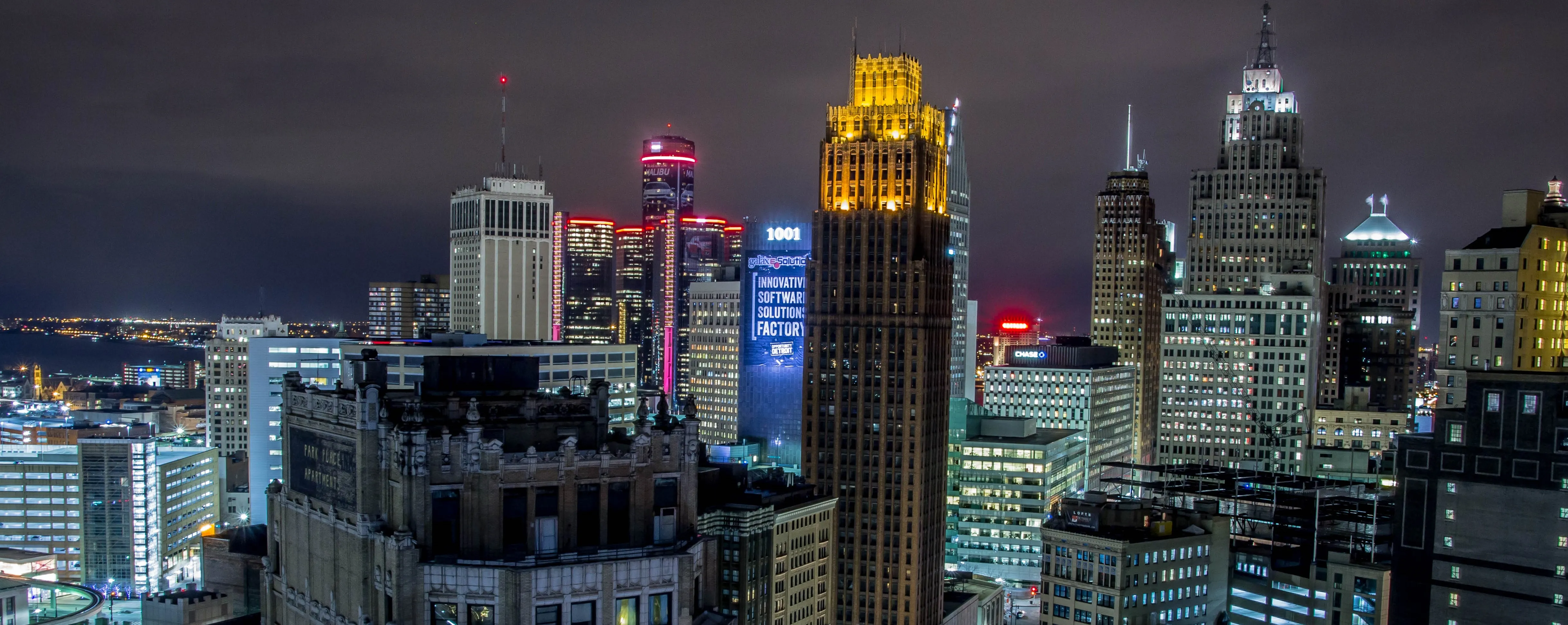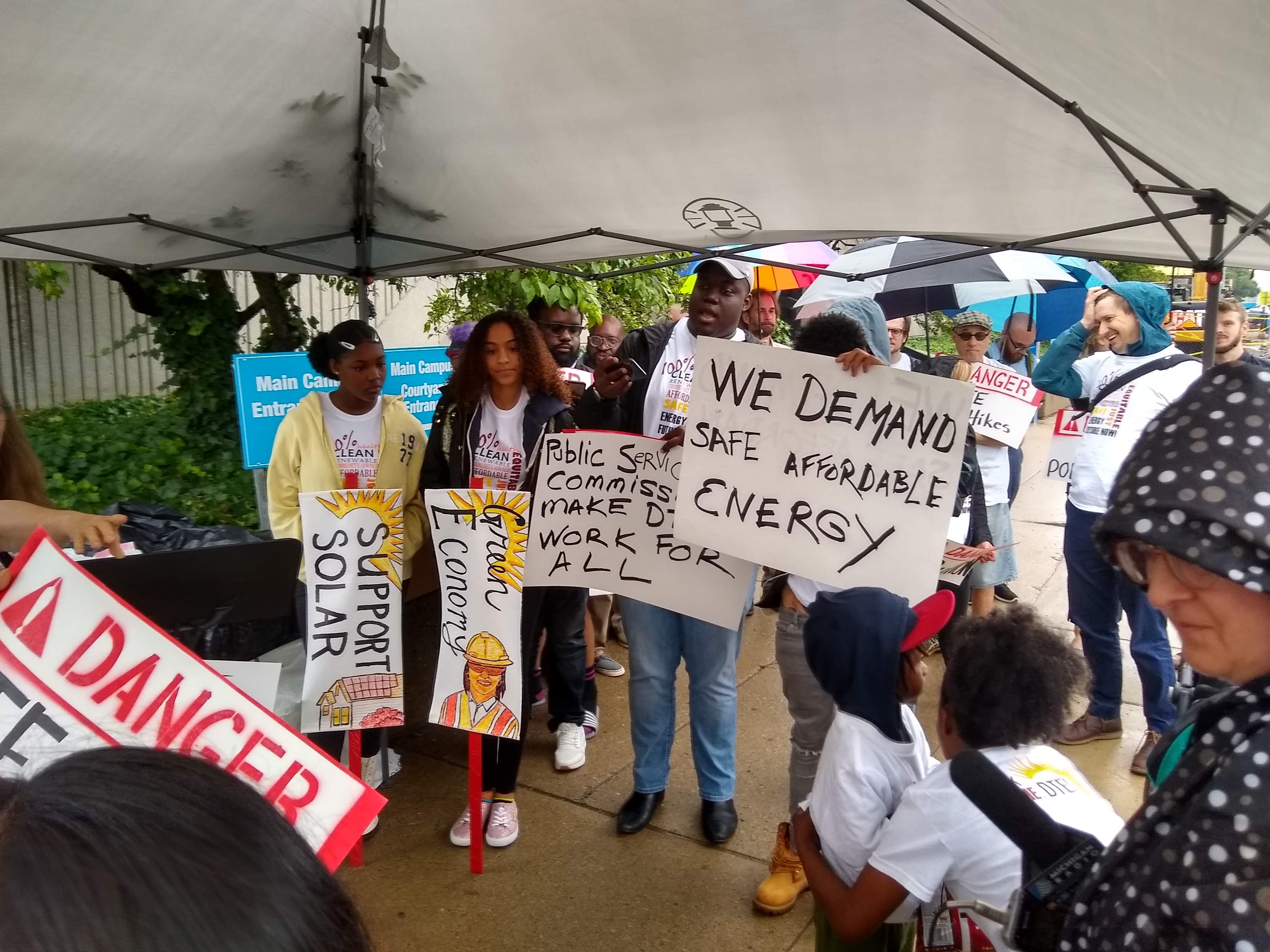Abrams Clinic Advocates for Energy Justice in Detroit

The Abrams Environmental Law Clinic had already spent months battling Detroit’s electricity provider over a proposed rate increase when the pandemic arrived last spring. Suddenly, the already pressing concerns about energy affordability took on a heightened urgency—and the clinic quickly switched gears.
“We were advocating for low-income consumers, highlighting how these individuals already suffer from energy insecurity, and how utility bills are often a much larger percentage of their income,” said Clinical Professor Mark Templeton, Director of the Abrams Clinic. “And once COVID-19 hit, we talked about how the pandemic was adding some serious additional challenges.”
The Abrams Clinic got involved in the initial the rate case through their client Soulardarity, a Detroit-area nonprofit that advocates for affordable energy rates, equitable service, and increased solar-powered energy in low-income neighborhoods. When DTE, Southeastern Michigan’s electricity and gas provider, proposed a rate increase before the Michigan Public Service Commission—the government entity that regulates investor-owned utilities like DTE and approves rate increases—Soulardarity was one of many parties to intervene and oppose the move. That opposition took on increased importance as the virus spread and stay-at-home orders took effect—and the Abrams Clinic began focusing on the ways in which higher electricity bills could create additional harms.
“A lot of people were laid off or furloughed because of the virus,” Templeton said. “As a result, they might not have the income to afford their energy bills. And for those people who are able to shift their work to home, they might be using more electricity, which would also significantly affect their budget.”
Lower-income neighborhoods are also more likely to experience power outages, dangerous downed power lines, and other energy issues that create additional strain during a crisis like COVID-19, Templeton and his students said.
“If a family is already struggling with food insecurity, and their electricity shuts off and they lose everything in their freezer, that can be detrimental,” said Camille Sippel, ’21, a student in the clinic who worked on the rate case. “Another example would be if someone is receiving at-home medical care, using a machine, and their electricity goes off—the last thing you want is to send an immunocompromised person to the hospital during a pandemic.”
In addition to the rate case with DTE, the Michigan Public Service Commission opened a separate docket seeking commentary from interested groups like Soulardarity on how utility companies might best respond during the COVID-19 crisis. The group effort led to a binding order offering certain minimum protections, such as stopping shut-offs, ending late payment fees, and ensuring that utilities could be easily restored. Recent graduate Olivia Cusimano, ’20, assisted with this initiative, and said it was rewarding to learn that her work with Soulardarity and its coalition partners had influenced the Michigan Public Service Commission’s COVID-19 proposals.
“In the wake of COVID, Soulardarity wrote a letter as part of the rate case, prior to this new proceeding being opened, about how [these minimum protections] needed to happen,” Cusimano said. “It was great to see that perhaps the Commission had listened to us. When they opened the new docket, we argued that this was a good first step, but certainly not the only step that they needed to be taking.”
Working on the rate case, the team—which in 2019-20 also included students Daniel Abrams, ’21, Jordan Kleist, ’22, Alexandra Koscove, ’21, Megan Delurey, ’21, Emma Sperry, ’21, M. Wynn, ’20, and Julian Zhu, ’21—raised some additional concerns. For instance, DTE’s return on equity was so high that it enabled shareholders, many of whom live outside Michigan, to earn money at the expense of customers receiving more reliable service.
“Part of our argument was asking why the shareholders should be enriched when DTE is providing such poor service to low-income communities,” Cusimano said. “And ultimately, the administrative law judge and the Commission ended up approving a return on equity that was slightly lower than the approved return from last year. So it seemed like that argument was recognized and heard by the Commission, and they responded accordingly. That was amazing to see—that even though I went into this knowing little about how any of it worked, I was able to actually do something.”
For Sippel, working with Soulardarity, both before COVID-19 and during, has been eye-opening. There was a lot to learn about the technical aspects of energy systems—complicated concepts that many take for granted—and disparities that extended beyond issues of energy access and affordability.
“I didn't fully understand the way that different communities are impacted by different energy systems,” she said. “A lot of energy sources that cause more pollution, such as [coal-powered plants], are often placed in low income neighborhoods. So on top of everything, those communities are experiencing higher rates of pollution as well.”
Soulardarity’s Executive Director and co-founder Jackson Koeppel said that working with the Abrams Clinic has helped the organization translate their broader values and goals into legal frameworks that can have a real impact.
“Having the clinic represent us, and having the capacity to be on the ground on the community side, and deeply engaged on the legal side, has allowed us to bridge that gap,” said Koeppel. “It’s been really impactful to have them work with us and support us, and help us realize our goals from the community side in these legalistic processes.”
Koeppel has appreciated the collaborative, flexible, and reliable relationship that has developed between Soulardarity and the Abrams Clinic over the years. Amidst the urgency of COVID-19, having the students and faculty in the clinic on Soulardarity’s side meant the organization could have a voice in the formal legal proceedings surrounding the virus’ impact on energy justice.
“It's been critical that the clinic is here to help us with things like drafting letters, figuring out where they should go in, and giving us the information we need to know how to engage in these processes,” Koeppel said. “Because there’s this collaborative relationship where they know what we want and they know what our goals are, they can really help to do those quick turnaround things and keep us in a process that otherwise, just capacity-wise, we would be falling out of.”
Giving students the opportunity to address these issues during law school is critical, said Assistant Clinical Professor of Law Robert Weinstock, who teaches with Templeton in the Abrams Clinic. Even before COVID-19 underscored the need for energy justice, students in the Abrams Clinic represented Soulardarity in five separate legal proceedings aimed at fighting for equitable energy in Detroit, engaging in thousands of pages of material in preparation and traveling to Michigan to cross-examine DTE witnesses.
“This project has brought together two of the most important social issues that we're facing right now,” Weinstock said. “It's dealing with the pandemic, and it’s dealing with social justice. Students are incredibly interested in these issues, and they want to make a difference. Doing this work shows them how, through law, they really can make a difference.”
Projects like these also demonstrate the wide range of issues environmental law clinics can take on, and the impact their work can have, Templeton added.
“All of this work—whether it’s related to COVID-19 or not—is very untraditional for environmental law clinics,” Templeton said. “In a sense, this is another step in the reconceptualization of what a traditional environmental law clinic is. We're talking about environmental justice, we’re talking about energy democracy, and we're talking about the pandemic. I think it just shows the evolution of environmental practices. It's a very different idea from what environmental law clinics have been doing traditionally and is a significant new way for us to have meaningful impact."

